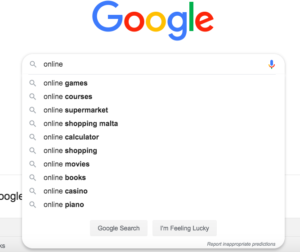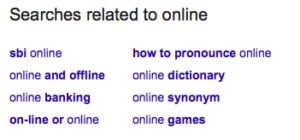Keyword research is crucial to getting organic traffic from Google in 2020. This is the starting point that determines the content you are going to write and the audience you are going to target.
An old buddy of mine is a great writer and had a very UNSUCCESSFUL blog. He was writing content that no one was looking for. After providing him tips on keyword research, his blog is now successful enough to pay off his home loan, support his family and help him achieve financial freedom.
Stick around, you might learn something new, or remember what you’ve neglected from when you couldn’t afford tools. Thankfully free methods are often better than the paid alternatives in the world of SEO.
1. The best tool to give you info about Google… is Google
If you know a little bit about GainChanger, you know that we don’t trust any single source of data. Well, unless that source is the search engine you are aiming to rank on.

When you are thinking about writing about a topic, start typing that topic into Google and take note of the suggestions Google is providing you. This is free and a great starting point to understand what people are looking for right now.

Search and scroll down to the bottom of the search results page or SERP to find more topics related to your current search query. You’ll find a lot of interesting topics to branch out your research from and write about.
2. If you’re not going to go straight to the source, Google Adwords is next in line
In search advertising or SEM (Search Engine Marketing) there are 2 ways that you could get your message and website in front of an audience:
- SEO – optimizing your strategies and content to rank your website organically on target keywords.
- PPC – paying Google and other search engines to show your website & message when people search target keywords.
Adwords is the advertising platform for paid Google search ads. This is where you’ll research & set up the keywords you want your message, target URL or domain to show for.
And this is why it’s the perfect place to get some insights into which keywords you should also target your organic efforts.
Set up an account for free by visiting https://ads.google.com, click ‘Start now’ and follow the steps. You can find plenty of guides on how to set up your account & Google tends to update its UX quite often, so we won’t cover that in this guide.

Once you’re all set up, click ‘Tools & Settings’ > ‘Keyword Planner’. Again Google tends to change its interface, so don’t be surprised the screenshot is not a representation of what you are seeing right now.
That said, the ‘Keyword Planner’ naming convention seems to have stood the test of time.

You then get two options:
- Discover new keywords: You can find keywords from an originating keyword, like ‘online casino’, or even a domain. To discover what your competition is ranking on.
- Get search volume and forecasts: Use this section to discover how much traffic you could get over a period of time, for a certain amount of marketing spend. The more expensive the price per click, the more competition there is on a keyword. This indicates that your competitors are making money out of these search queries.
There are plenty of in-depth guides on how to use these tools, but let’s not get into the nitty-gritty of it. Feel free to contact us if you would like some pro tips.
Tip: Check out the competition for the keywords you have researched from Google search. If you don’t see any of your competitors or search results relevant to your niche, then you are most likely barking up the wrong tree.
Pro Tip: Set up Google Ads before committing too much time & budget to organically ranking on particular keywords. You’ll get instant insights into how valuable those organic search queries are to your business and acquisition funnel.
3. More free keyword research tools: Google Search Console, Answer the public, Reddit, Bing Suggest, Google trends
Remember how we mentioned that we don’t trust any single source of data? Well, nothing will confirm this more than Google Search Console. It’s free to set up on your website and will show you keywords that you are getting views or impressions on.
You’ll quickly find keywords that all your paid tools are saying there is no search volume for, but actually are getting loads of impressions and clicks.
Never trust my friends, never trust.
Answer the Public is one of my favorite tools to get over creative blocks. It has a free element to it that helps you discover loads of new keyword opportunities related to your main topic.
Reddit is THE place to be for audience insights. Chances are that some of your target audience is hanging out on Reddit asking questions and chatting on topics related to your line of business. Search for your main topic and check out all the subreddits for your target audience. This is a great place to get inspiration on keyword topics to go after.
Bing Suggest works on the same principles as Google Suggest. You start typing your topic into Bing search and Bing provides you autocomplete suggestions from popular user searches in your locale & country.
Google Trends is a great free tool from Google that allows you to check how search topics are growing and shifting over time. This helps you prepare for seasonal and situational search interest as the world changes and evolves.
Final Thoughts
Whether you’ve been in the SEO game for a while or are new to the game, great SEO strategies do not begin with expensive subscriptions and complex tools. Great SEO strategies begin with great thought processes.
It’s about aggregating data from multiple sources & methods to determine a hypothesis about what you should focus on. A wise individual once told me that it’s not about the amount of traffic you target which makes you successful, it’s about targeting the right traffic.
At GainChanger we’ve been doing this for years in multiple industries and seen the rise and downfall of many different practices along the way. That’s why we’ve worked on transferring years of knowledge and expertise into AI-based solutions.
This helps you achieve what we do best, better, faster and cheaper. Want to learn more? Get in touch with us today and take advantage of a free 15-minute consultation.

Gain Changer co-founder Sean Bianco is well-versed in determining market trends. Emphasis is placed on understanding relationships between technical problems and customer impact, resulting in customer-driven products and services.

